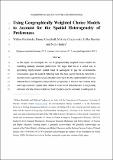Using geographically weighted choice models to account for the spatial heterogeneity of preferences
Abstract
In this paper, we investigate the use of geographically weighted choice models for modelling spatially clustered preferences. We argue that this is a useful way of generating highly-detailed spatial maps of willingness to pay for environmental conservation, given the costs of collecting data. The data used in this study come from a discrete choice experiment survey of public preferences for the implementation of a new national forest management and protection programme in Poland. We combine these with high-resolution spatial data related to local forest characteristics. Using locally estimated discrete choice models we obtain location-specific estimates of willingness to pay (WTP). Variation in these estimates is explained by characteristics of the forests close to where respondents live. These results are compared with those obtained from a more typical, two stage procedure which uses Bayesian posterior means of the mixed logit model random parameters to calculate location-specific estimates of WTP. We find that there are indeed strong spatial patterns to the benefits of changes to the management to national forests. People living in areas with more species-rich forests and those living nearer bigger areas of mixed forests have significantly different WTP values than those living in other locations. This kind of information potentially enables a better distributional analysis of the gains and losses from changes to natural resource management, and better targeting of investments in forest quality.
Citation
Budzinski , W , Campbell , D , Czajkowski , M , Demsar , U & Hanley , N 2017 , ' Using geographically weighted choice models to account for the spatial heterogeneity of preferences ' , Journal of Agricultural Economics , vol. Early View . https://doi.org/10.1111/1477-9552.12260
Publication
Journal of Agricultural Economics
Status
Peer reviewed
ISSN
0021-857XType
Journal article
Description
This study uses data collected as the part of the POLFOREX project (‘Forests as a Public Good. Evaluation of Social and Environmental Benefits of Forests in Poland to Improve Management Efficiency’; PL0257) funded by EEA Financial Mechanism, Norwegian Financial Mechanism and Polish Ministry of Science and Higher Education. MC gratefully acknowledges the support of the Polish Ministry of Science and Higher Education and the National Science Centre of Poland (project 2015/19/D/HS4/01972). WB gratefully acknowledges the support of the Foundation for Polish Science (FNP).Collections
Items in the St Andrews Research Repository are protected by copyright, with all rights reserved, unless otherwise indicated.

